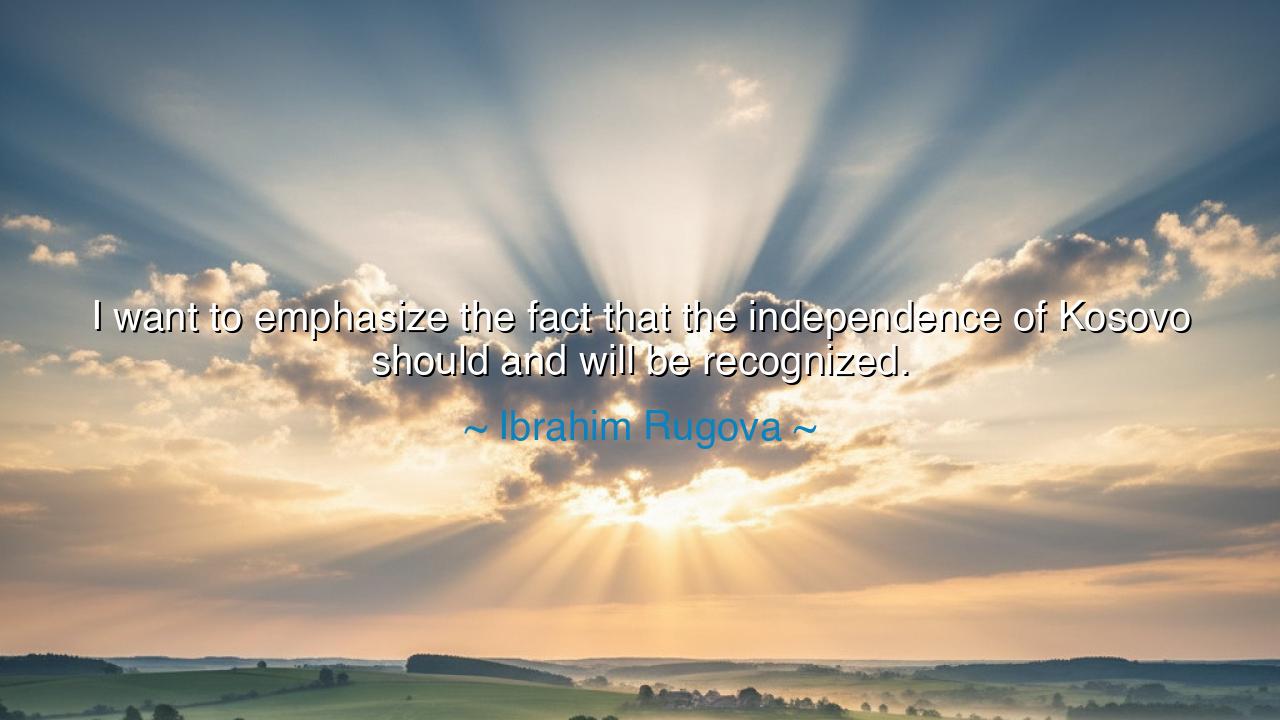
I want to emphasize the fact that the independence of Kosovo
I want to emphasize the fact that the independence of Kosovo should and will be recognized.






Hear the steadfast voice of Ibrahim Rugova, the “Gandhi of the Balkans,” who once proclaimed: “I want to emphasize the fact that the independence of Kosovo should and will be recognized.” These are words of quiet defiance and patient courage—spoken not from the seat of victory, but from the long road of endurance. They come from a man who led his people through oppression without the sword, through exile without surrender, through despair without losing faith. Rugova’s declaration was not a threat—it was a promise, born of hope, persistence, and the belief that the truth of a people’s identity cannot be silenced forever.
When Rugova spoke of independence, he was not merely demanding borders or symbols; he was invoking the right of a people to exist with dignity. Kosovo had lived through decades of tension and suppression, its Albanian majority stripped of political autonomy and cultural recognition under Yugoslav rule. Yet, Rugova chose not the path of violence, but of peaceful resistance—a rare and noble road in an age of turmoil. His vision was one of moral power, rooted in the belief that freedom gained through patience is stronger than freedom taken by force. Thus, his words are both prophecy and prayer: that one day the world would recognize what already lived in the hearts of the Kosovar people—their right to be free.
The story of Kosovo’s struggle mirrors those of many nations that sought self-determination against the weight of empire. Like India under British rule, where Gandhi’s nonviolence shook the might of the empire, Rugova too sought to make resistance an act of moral strength rather than destruction. His “parallel government” in the 1990s—schools, healthcare, and institutions operating quietly under repression—was an act of creation amid desolation. It was as though he were saying: “You may take our rights, but not our resolve; you may silence our voice, but not our identity.” His leadership reminds us that independence, when guided by principle, is not rebellion—it is restoration.
Rugova’s words also reveal the dual nature of freedom: it is both external and internal. To achieve political recognition is one form of liberty, but to remain steadfast in the face of injustice is another, deeper one. When he said that Kosovo’s independence “should and will be recognized,” he spoke not merely of diplomacy, but of destiny. The truth of freedom, once awakened in a people’s soul, cannot be denied forever. Empires may delay it, and politics may obscure it, but time itself becomes its ally. History bends, however slowly, toward those who hold firm in righteousness.
And indeed, though Rugova did not live to see the full fruit of his labor, his prophecy was fulfilled. In 2008, two years after his passing, Kosovo declared independence, and the world began to acknowledge what he had long foreseen. It was not an easy birth—its recognition was, and remains, contested—but it was a moment in which Rugova’s words were vindicated. His quiet voice had sown the seeds of a freedom that generations would reap. He had shown the world that the power of peaceful conviction can outlast the thunder of war.
The ancients would have called such a man a philosopher-king—a leader who governs by wisdom rather than by will, by truth rather than by force. Rugova’s way teaches us that even in the darkest night of oppression, one must not abandon the light of civility, compassion, and reason. His message transcends borders: whether in the fight for a nation’s liberty or the soul’s integrity, one must hold to the belief that recognition comes to those who endure with honor.
So let the lesson of Rugova’s words be carried forward. Freedom is not always won by the loudest cry, but by the most unwavering heart. When you face injustice, do not let bitterness corrupt your cause; let dignity be your shield, and patience your sword. For the day will come when truth is seen clearly, and independence—of nations, of spirit, of conscience—will be recognized.
Thus, remember Ibrahim Rugova as more than a politician; remember him as a sage of perseverance. His voice, calm and steady amid the storm, reminds us that the greatest revolutions are born not in fury, but in faith—faith that justice, however delayed, shall prevail, and that those who stand firm in peace will one day see the world bend toward their freedom.






AAdministratorAdministrator
Welcome, honored guests. Please leave a comment, we will respond soon